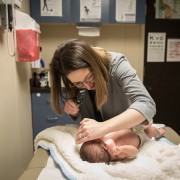Care Team
As primary care shifts from transactional to quality focused, incorporating a care team has become even more beneficial. In order to provide comprehensive, patient-centered care, more than just the clinician must play a role. The care team consists of physicians, nurse practitioners, PAs, nurses, care managers, dieticians, and social workers, among others. Having a large, well-coordinated team allows patients to avoid the confusion when attempting to access primary care services and leads to better connectedness in their care. The care team is totally devoted to ensuring that the patient is at the center of the care process. As the driver of the care team, the patient is especially involved in choosing their course of care. Care teams are essential in coordination, and continuity of care. As clinics develop a care team, it is critical that they include the patient voice, to ensure that they are effectively meeting the patients' needs. If the care team lacks cohesion, it will only further contribute to the current, fragmented system.
Resources

Annals of Family Medicine | November 2012

Health Affairs | November 2012

Maternal Child Health | October 2012

Patient-Centered Primary Care Collaborative | September 2012

Institute of Medicine | September 2012

Health Affairs | September 2012
- ‹ previous
- 17 of 19
- next ›
News
July 2, 2018 | The Hill
June 8, 2018 | Modern Healthcare
- ‹ previous
- 17 of 64
- next ›
Events & Media
October 29, 2015
- ‹ previous
- 17 of 49
- next ›
Related Content
|
Title |
Source | Date |
|---|---|---|
| Medical home transformed to include families, communities | Anchorage Daily News | May 26, 2014 |
| Medical Homes Bring Customer Service to Health Care | U.S. News & World Report | September 6, 2013 |
| Medical homes with the patient at the center | Health Affairs | May 3, 2013 |
| Medical homes: A fix for our broken healthcare system | Fierce Healthcare | May 30, 2014 |
| Medical homes: Where coordinated care 'resides' | Bankrate | May 8, 2013 |
| Medicare Data Show Wide Differences In ACOs’ Patient Care | Kaiser Health News | February 21, 2014 |
| Medicare Final Rule Boosts ACO Care Coordination Incentives | Fierce Healthcare | June 7, 2016 |
| Meet PCPCC 2018 Advanced Primary Care Leadership Awardees | October 4, 2018 | |
| Mental Health and Primary Care Integration - PCPCC Letter to Senate Finance Committee | September 30, 2013 | |
| Military health review verifies a pearl: secure doctor-patient email | Stars and Stripes | October 9, 2014 |
Pages
Associated Stakeholders:
Secondary menu
Copyright © 2024 Primary Care Collaborative






